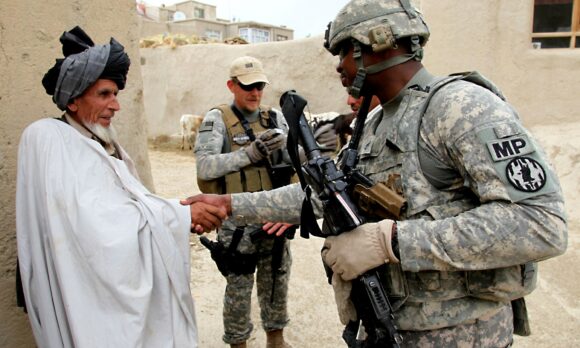
August 14, 2021
CNAS Responds: The Deteriorating Situation in Afghanistan, Two Weeks from Drawdown Deadline
The official deadline for the U.S. military withdrawal from Afghanistan is just over two weeks away; but after a rapid succession of territorial gains, the Taliban has taken back near total control. The U.S. and other allies are evacuating their citizens and some Afghan nationals in a chaotic rush at the airport. Thousands of special visa applicants are still desperately trying to escape. CNAS experts unpack the implications of what is unfolding and what could—and should—happen next. To arrange an interview, email [email protected].
On Thursday, August 19th, CNAS will host a virtual event on the status of special immigrant visa applicants in Afghanistan with Rep. Seth Moulton, Amb. Richard Armitage, Richard Fontaine, and Lisa Curtis. RSVP HERE.
- Richard Fontaine, Chief Executive Officer: "In 2001, a brutal Taliban regime linked to al Qaeda ruled most of Afghanistan. After this week’s lightning advances, a brutal Taliban regime linked to al Qaeda will rule most of Afghanistan. The decision to withdraw American troops, and the way in which the departure took place, will spur searching debates. There will be time for that. Today, however, acute policy choices remain before our national leaders.
"The implications of Taliban conquest go beyond historical pathos and humanitarian horrors. The threats generated by a renewed terrorist sanctuary, large refugee flows, and peril to America’s helpers are real. Policymakers now face a formidable agenda: evacuating Americans, Afghan interpreters and helpers; securing regional base access for counterterrorism operations; assisting civil society and Afghan government personnel under significant threat; dealing with refugee flows that could rival Syria’s in volume; and countering a jihadi narrative of superpower defeat. After two frustrating, grinding decades, events in Afghanistan are moving very fast." - Lisa Curtis, Senior Fellow and Director of the Indo-Pacific Security Program: "As the Taliban makes rapid gains throughout the country and marches toward Kabul, the immediate focus should be on safely evacuating U.S. citizens as well as thousands of Afghans who have assisted the United States and would otherwise become victims of Taliban revenge killings. These include Afghan government and military officials and civil society leaders that have received U.S. funding and encouragement to work on human rights and women’s issues. They have targets on their backs because of their cooperation with the United States and Washington has a moral obligation to protect them.
"The second priority should be on preventing a humanitarian disaster. The number of internally displaced people is spiraling throughout the country and thousands are streaming into Kabul. The international aid community must mobilize and act quickly to stave off the crisis.
"Third, the U.S. diplomatic posture must shift from begging the Taliban to join a peace process to leading an international effort to prevent any further Taliban atrocities or war crimes. Indeed, the UN Security Council should slap sanctions on Taliban leaders for atrocities already committed, such as last Friday’s assassination of the Afghan government media chief." - Jason Dempsey, Adjunct Senior Fellow for Military, Veterans, and Society: "The rapid disintegration of Afghan security forces and the lightning advance of the Taliban is reflective of a fundamental flaw in our efforts of the past twenty years: We built a national army in Afghanistan for a nation that simply does not exist. We must now come to grips with the reality of the Taliban sweeping away most of the military and governmental structures we propped up, and hopefully begin to understand that no amount of American military involvement can overcome a host government’s lack of legitimacy. In the short term, however, we must do all we can to assist those who worked with us in the fight against extremism and help them find safety – ideally here in America."
- Chris Dougherty, Senior Fellow for Defense: "Afghanistan, Iraq, Vietnam. Each marks a major U.S. effort that failed to build a partner military capable of resisting armed incursion absent U.S. aid. These efforts cost the lives of tens of thousands of U.S. service members, trillions of taxpayer dollars, and scarred host nations and American politics. So long as building partner capacity remains an unexamined part of U.S. defense strategy, similar failures stalk our future. To avoid this, Congress, with the full cooperation of the Pentagon and intelligence community, must launch a bipartisan investigation to ascertain the causes of failure and identify strategy and policy solutions."
- Christopher Kolenda, Adjunct Senior Fellow: "When you have buy-in, people give their discretionary efforts and stand their ground when the going gets tough. Without buy-in, people vote with their feet. The Afghan government and security forces, which Americans have spent 20 years and $2 trillion building, are dismantling themselves almost overnight. The best hope is for Afghans to negotiate an agreement that avoids new catastrophes and gains people’s buy-in for a durable peace."
- Katherine Kuzminski, Director of the Military, Veterans, and Society Program: "As the U.S. withdraws from Afghanistan, it provides an opportunity to reflect upon the many ways the conflict changed the way the U.S. military manages its people. Perhaps the most significant change over the course of the conflict was the way in which the services—particularly the Army and the Marine Corps—employed women in combat capacities. The unique military requirements of the conflict in Afghanistan gave rise to a deeper understanding of women service members’ contributions to combat operations across the U.S. military. The war in Afghanistan leveraged their unique role through Female Engagement teams, who provided critical relationships with Afghan society and increased operational situational awareness. Women’s contributions were not limited to women-specific missions; they led in traditional combat operations even before combat restrictions were lifted for women in the ground services, as demonstrated by the more than 9,000 women who earned Combat Action Badges in Iraq and Afghanistan. Their experience positions a generation of women in uniformed leadership with the combat experience necessary to lead the future force."
- Stacie Pettyjohn, Director of the Defense Program: "The withdrawal of U.S. forces from Afghanistan has enabled the Taliban to overrun large parts of the country with alarming speed. The Biden administration should have deliberately planned the departure of American troops and taken steps to better manage the foreseeable humanitarian crisis that is unfolding. Nevertheless, keeping American forces indefinitely in Afghanistan, which has no prospect of achieving a durable political victory, also is not a sustainable solution. The last twenty years has shown the challenges of nation-building. It is past time to admit that we have failed and to move on. America’s role in this Afghan tragedy must come to an end, even though it is painful to watch."
- Paul Scharre, Vice President and Director of Studies: "The situation unfolding in Afghanistan is heartbreaking. The alternative -- continuing to throw away American lives on a losing war -- would have been worse. Afghan government forces’ rapid collapse puts the lie to twenty years of U.S. nation-building. For the last several years, the U.S. government has attempted to transition the war to a sustainable footing in which Afghan forces could hold their own against the Taliban with reduced U.S. involvement at a politically acceptable cost in the United States. This effort failed. The Taliban has steadily gained ground for years and U.S. troops have continued to die by hostile fire. President Biden has finally done what his two predecessors had promised to do but were unable to accomplish, overruling the Pentagon and ending U.S. involvement in a failing war. America’s failure of two decades of involvement in Afghanistan should prompt a sober reassessment of the limits of military power."
- Jim Townsend, Adjunct Senior Fellow for Transatlantic Security: "As gripping as Afghanistan’s collapse is today, we must focus quickly on planning for what happens if, and when, Kabul falls. The humanitarian situation will likely be dire and iPhone video of refugees desperately trying to flee a chaotic Kabul will be heartrending. We saw this happen in Vietnam in 1975, which featured not only Hueys being pushed over the side of U.S. aircraft carriers after having flown refugees out to overcrowded U.S. ships, but with Operation Babylift, the massive airlift of approximately 3,300 children from South Vietnam as Saigon fell. The worse is yet to come in Kabul. The US (and yes, NATO) need to be ready for a humanitarian operation that will be much more difficult logistically than the one in Vietnam. We can argue and philosophize about who lost Afghanistan later, and there is much to discuss. But before we begin to pontificate, we have to get our act together and plan for how to undertake a massive multinational humanitarian operation the likes of which we have never seen before."
- Carisa Nietsche, Associate Fellow, Transatlantic Security Program: "The United States’ European allies have been relegated to a footnote in the story about the U.S. withdrawal from Afghanistan. Yet, NATO allies fought alongside U.S. forces in Afghanistan. Furthermore, Europe has a lot to lose from the U.S. withdrawal and Taliban control of Afghanistan. It will be Europe who will experience another wave of migration, which previously contributed to rising nationalist and populist parties there. Another cause for European concern is Turkey's desire to ramp up its presence in Afghanistan. This could portend a situation akin to the Syrian refugee crisis, with Turkey controlling migration flows to get leverage with the European Union."
- Nathalie Grogan, Research Assistant, Military, Veterans, and Society Program: "While the American public is being thrust back into the human costs of the Afghanistan conflict, nearly 800,000 service members and their families have been wrestling with it acutely over the past 20 years. Nearly 2,400 American service members lost their lives while serving in Afghanistan, and many veterans who served there continue to wrestle with a variety of emotions and opinions about their experiences in-country, the moral cost of war, and their relationship to the civilian population. As the broader public is watching Afghanistan’s tragedy, it is vital that we as a nation ensure the further care of the veterans and military families who made tremendous sacrifices for the mission."
To arrange an interview, contact Sydney Simon at [email protected] or [email protected].
Learn more:
Special Event | Against the Clock: Saving America's Afghan Partners
Richard Fontaine, Richard L. Armitage, Lisa Curtis, Rep. Seth Moulton
Aug 19, 2021
Afghanistan Pullout Isn’t as Popular as It Seems
Domestic demand for an American withdrawal may not be strong as it seems....
Virtual Book Discussion: The Hardest Place: The American Military Adrift in Afghanistan's Pech Valley
Paul Scharre, Wesley Morgan
Mar 11, 2021
Virtual Panel Discussion: A Conversation with Women Veteran Authors
Pamela Brodman, Diane Carlson Evans, Kelly Kennedy, Maggs Vibo, Dr. Jeannette Gaudry Haynie, Nathalie Grogan
Mar 17, 2021
The best case against withdrawing all US troops from Afghanistan
President Joe Biden has a big, looming decision to make by May 1: whether or not to withdraw all 2,500 US troops from Afghanistan and end America’s 20-year war in the country....
Taliban Ascendance in Afghanistan Risks Return of Global Terrorist Hub
Walking in the Trump administration’s footsteps, the Biden team is making several miscalculations about the Taliban, which will exacerbate the negative impacts of the withdraw...






